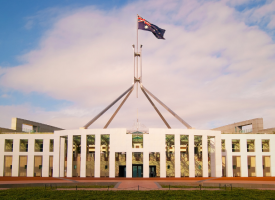Transcript - Dr Michael Gannon - Sky News - Hospital Funding
Transcript: AMA President Dr Michael Gannon, Sky News, Monday 29 May 2017
Subjects: Private Health Insurance Rebate; Hospital Funding, Drug Decriminalisation
ASHLEIGH GILLON: Returning now to Federal politics, as we heard earlier, the Government has rejected a proposal to abolish the private health insurance rebate and effectively pull the cash it saves from that, along with hospital funding, to provide a standard benefit for services, regardless if they happen in a public or in a private hospital.
Joining us now, live, is Michael Gannon. He's the President of the Australian Medical Association. Good to see you, Michael, thank you for your time.
As I mentioned, the Government was quick to reject this proposal when it was aired in Estimates in Canberra today, but did the plan, as outlined, have any merit in your view?
MICHAEL GANNON: Well, I think a 35 per cent share would be a disaster in the public system. It would be a disaster in the private system. What we've seen in recent years is the Commonwealth's share of the spend on public hospitals drop below 45 per cent with a formula that relies on growth only in CPI and population. So that puts it somewhere between 40 and 45 per cent. And now, our own Report Card shows that by any metric of performance in the system, whether that's emergency department waiting times, whether it's elective surgery waiting times, things are going sideways or backwards. So, a 35 per cent share would be a disaster. I'm not surprised the Minister's already ruled it out.
ASHLEIGH GILLON: Kevin Rudd had thought he'd solved the hospital funding mix, what, almost a decade ago now. But there is a lot of talk about a new shake up for the way hospitals are currently funded. What should be the priorities, do you think, for a more long term agreement on hospital funding?
MICHAEL GANNON: Well, we know that when Mr Rudd was Prime Minister, he proposed a 50-50 share. And what he wasn't able to achieve, unfortunately, was an end to the Commonwealth versus jurisdictions blame game. What we know is that 45 per cent just wasn't enough. And what we're keen to work with the Minister on are things that might work in the hospital system. We're keen to look at quality and safety initiatives. We're keen to look at ways - ways things could be better done in secondary hospitals or in the community. We think this government needs to do better on prevention as a long term effort of reducing public hospital spending. So we've got a long way to go, but at 42 per cent, 43 per cent, wherever we're at now, that's not enough. Thirty-five per cent would be a disaster.
ASHLEIGH GILLON: Let's look at what the Government is actually doing at the moment. Much has been made, of course, about the Government's decision to unfreeze the GP rebate, but now it is clear that a range of GP services will still stay frozen for another three years. Will you be continuing the AMA's campaign against the Government on this issue or are you happy with the compromise that was reached in the Budget?
MICHAEL GANNON: Well, we've made it very clear that this is not as we would have had it. We would have liked to have seen an immediate re-indexation of the entire MBS on 1 July this year. While we're at it, we would like to see re-indexation of radiology which has gone nowhere for 18 years. We would have liked to have seen re-indexation of pathology. So it's not as if the Government has given us everything that we would ask for in terms of the measures that would support the entire health system. But certainly, what my public comments have said, and what my private commentary with the Minister has said, is that he's given himself the clear air to at least talk about elements of the health system. So, as far as I'm concerned, we should be looking at those care plan items, those mental health items, and whether they can be re-indexed sooner rather than later.
He's got rid of the most disastrous elements of the 2014 Budget, he's given himself the clear air to talk about, you know, the 20 or 30 other things that we need to talk about going forward.
ASHLEIGH GILLON: I understand Mr Shorten told the AMA's National Conference on Friday that the Government's approach to this was ‘cash for no comment’. That was interpreted as being an attack on your organisation for accepting the Government's staged approach. What did you make of that? Were you offended by it?
MICHAEL GANNON: No, look, I certainly wasn't offended and I look forward to ongoing productive conversations, both with Mr Shorten and with Catherine King - as I've said for the whole year I've been in the job, Ashleigh - with the Greens and the crossbench as well. We're ready to talk to every side of the Parliament about the things which will and won't work in both the public hospital system, the private hospital system, in general practice, in prevention. So I'll leave it to you and to other experts to talk about the politics of this. My expertise is in health. The only commentary I've made politically is that Greg Hunt, Malcolm Turnbull, have given their Government the clear air to negotiate on matters, having left the catastrophe of the 2014 Budget behind them.
ASHLEIGH GILLON: Just finally, I note that the AMA there in WA is calling for personal drug possession to be decriminalised. Your State colleagues are arguing that addiction should be treated as health, not a criminal issue. Is that a position you support? I saw it was one that the Premier there, Mark McGowan, ruled out today.
MICHAEL GANNON: Yeah, I've read both Dr Andrew Miller's comments and Mr McGowan's comments. Look, what we would always say on this issue is, look, let's look at the evidence. So let's look at what has worked in Portugal, what has worked in Switzerland, what has worked in the Netherlands, and see whether it works. And if there is any proposal along this line, let's look at it scientifically. So you can't just assume that the Portuguese experiment with their very small, concentrated population would work in Australia, where the fact is that some of the biggest problems in drugs are in our small country towns, remote from services. Let's see the evidence.
So I know where Andrew was going with his comments; he was saying that the current method of focussing all our resources on policing and punitive measures is not working. Our emergency departments are proof that we have a problem with methamphetamine, with other illegal drugs, with their combination with alcohol. Maybe we should be looking at small, discrete trials in different parts of Australia, and if the science shows it works, well, then maybe we can adopt it for Australia.
ASHLEIGH GILLON: Okay, but at the moment the national AMA doesn't support this idea of decriminalising drugs for personal use?
MICHAEL GANNON: Look, I think if you look more closely at Andrew's comments, I'd say he was saying let's be open minded about it. So if we can look at a limited jurisdiction and see how things might work and analyse it in a serious way, and look and see whether there is scientific evidence that, in the Australian context, that a different approach can work, then we should certainly at the very least look at it.
ASHLEIGH GILLON: Michael Gannon, appreciate your time. Thanks for joining us on The Latest this evening.
MICHAEL GANNON: Okay, a pleasure, Ashleigh.
29 May 2017
CONTACT: John Flannery 02 6270 5477 / 0419 494 761
Maria Hawthorne 02 6270 5478 / 0427 209 753



